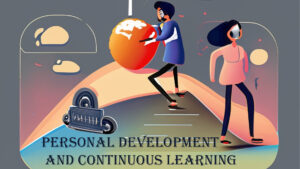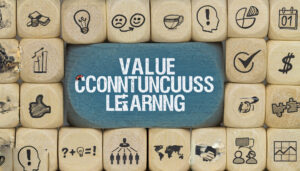
Personal Development and Continuous Learning
In the dynamic world of freelancing, personal development and continuous learning are key to staying competitive, adapting to industry changes, and reaching your full potential. In this chapter, we’ll explore the importance of ongoing growth and strategies to cultivate your skills and knowledge.
Embracing Lifelong Learning
- Stay Informed: Keep yourself updated with industry trends, emerging technologies, and market shifts. Buy into industry-explicit bulletins, writes, and digital broadcasts.
- Online Courses and Workshops: – Enroll in online courses and workshops that enhance your existing skills or introduce you to new ones.
– Stages like Coursera, Udemy, and LinkedIn Learning offer many courses
- Certifications and Training: – Pursue relevant certifications to validate your expertise. Certifications can boost your credibility and attract clients looking for specialized skills.
Networking and Collaboration
- Professional Networks: – – Stages like Coursera, Udemy, and LinkedIn Learning offer many courses. Networking provides opportunities to learn from peers, share insights, and collaborate on projects.
- Mentorship: – Seek mentorship from experienced freelancers or professionals in your industry. A mentor can offer guidance, share valuable experiences, and help you navigate challenges.
Experimentation and Innovation
- Personal Projects: – Undertake personal projects that allow you to explore new skills or experiment with creative ideas. These projects can serve as a portfolio showcase.
- Innovative Tools and Technologies: – Be open to adopting new tools and technologies that can streamline your work processes or provide innovative solutions to client problems.
Time Management and Productivity
- Time Management Techniques: – Continuously refine your time management techniques to maximize productivity. Explore methods like the Pomodoro Technique, time blocking, or task prioritization.
- Productivity Apps: – Utilize productivity apps and tools to help you stay organized, manage tasks, and track your progress.
Soft Skills Development
- Communication Skills: – Enhance your communication skills, including active listening, negotiation, and written and verbal communication. Effective communication is essential for client relationships.
- Problem-Solving and Critical Thinking: – Foster your critical thinking and decisive reasoning skills. These skills are invaluable when facing complex client challenges.
Self-Care and Wellness
- Work-Life Balance: – Prioritize work-life balance to prevent burnout. Distribute time for rest, unwinding, and exercises that revive your brain and body.
- Physical and Mental Health: – Focus on your physical and mental prosperity. Regular exercise, a healthy diet, and mindfulness practices can boost your overall health and productivity.
Feedback and Reflection
- Seek Feedback: – Constantly look for criticism from clients, companions, and guides. Useful input assists you with distinguishing regions for development.
- Reflect and Adapt: – Routinely think about your independent process, victories, and difficulties. Utilize these reflections to adjust your systems and put forth new objectives.
Goal Setting and Planning
- Set SMART Goals: – Establish SMART (Specific, Measurable, Achievable, Relevant, Time-bound) goals for your freelance career. Goals provide direction and motivation.
- Create a Professional Development Plan: – Develop a plan for your personal and professional growth, outlining the skills you want to acquire and the milestones you aim to achieve.
Personal development and continuous learning are ongoing processes that contribute to your success as a freelancer. By investing in your growth and adaptability, you’ll remain competitive, provide exceptional value to clients, and find fulfillment in your freelancing career. In the final chapter, we’ll bring together the key principles and strategies covered in this book to help you create a roadmap for a thriving freelance business.

The Value of Continuous Learning
- Adaptation to Change: – Continuously updating your skills allows you to adapt to changing industry trends, emerging technologies, and evolving client needs.
- Enhanced Expertise: – Continuous learning deepens your expertise in your niche, making you a more valuable asset to your clients.
- Expanded Opportunities: – Learning new skills opens up a broader range of opportunities and allows you to take on a more diverse set of projects.
Strategies for Skill Development
- Online Courses and Tutorials: – Utilize platforms like Coursera, Udemy, and LinkedIn Learning to access courses in various domains relevant to your freelance services.
- Industry Workshops and Conferences: – Attend workshops, conferences, and seminars related to your field to learn from experts, network, and gain insights into the latest industry developments.
- Books and Publications:– Read industry-relevant books, journals, and publications to deepen your knowledge and stay informed about industry advancements.
- Collaboration and Peer Learning: – Collaborate with fellow freelancers, join communities, and engage in knowledge-sharing to learn from peers and gain different perspectives.
Cultivating Soft Skills
- Communication: – Work on enhancing your communication skills, both written and verbal, to effectively convey ideas and collaborate with clients and teams.
- Time Management: – Improve your time management skills to handle multiple projects efficiently and meet deadlines consistently.
- Problem-Solving and Critical Thinking: – Develop problem-solving abilities and critical thinking skills to address challenges and provide innovative solutions.
Building a Growth Mindset
- Embrace Challenges: – View difficulties as any open doors for development instead of hindrances. Embrace them with a positive and proactive mentality.
- Seek Feedback and Learn from Mistakes: – Welcome feedback from clients and peers, and use it as a tool for improvement. Learn from your mistakes and constantly strive to enhance your performance.
Adaptability and Flexibility
- Be Open to Change: – Embrace change and be willing to adapt to new technologies, methodologies, or market demands.
- Continuous Assessment and Adjustment:– Regularly assess your strategies, approaches, and goals. Be ready to adjust and refine them based on changing circumstances and feedback.
Balancing Work and Learning
- Create a Learning Schedule: – Apportion committed time for learning in your timetable. Treat it as you would any other important task or project.
- Integrate Learning into Projects: – Apply the knowledge gained from your learning initiatives directly into your freelance projects to reinforce your understanding and skills.
Continuous personal development and learning are not only essential for your freelance career but also for your personal growth and fulfillment. Embrace the journey of lifelong learning, and it will undoubtedly enrich both your professional and personal life. In the upcoming chapter, we’ll delve into the importance of self-care and maintaining a healthy work-life balance as a freelancer.
